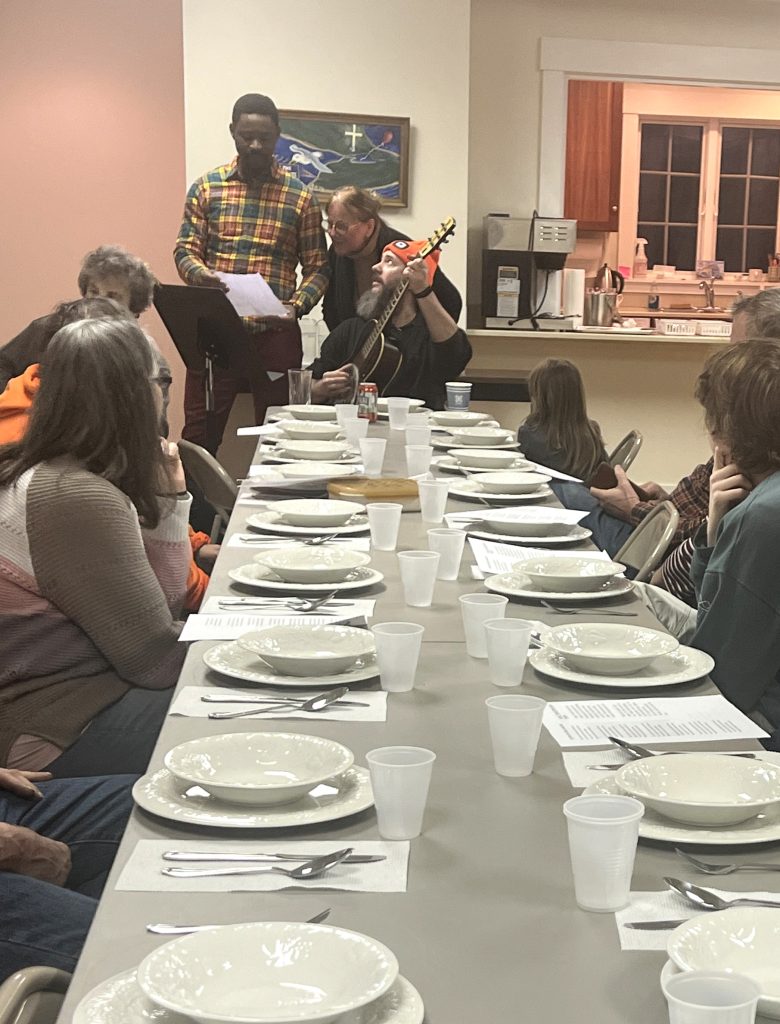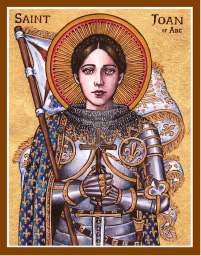
Tuesday night, members of both the church and the community gathered to learn about St. Joan of Arc and to share food together. The evening began with singing and a short lesson and then dinner was served. Joan of Arc is the unofficial patron saint of New Orleans so the theme was festive and delicious!
Thank you to Charlotte Wright for the rice and butternut squash soup, to Judy Mayhew for the veggie casseroles and salad, and to Sarah Carr for the KING Cake cupcakes with surprises hidden inside.
Sean McMahon put together the program about St. Joan, and Rolino Joseph helped with the French lyrics. Everyone cheerfully chipped in to clean up.




St. Joan of Arc
Unofficial Patron Saint of New Orleans
St. Joan of Arc, also known as Jeanne d’Arc, was born in Domrémy, a small village in northeastern France, around 1412. Canonized a saint in 1920, she is a larger-than life young woman remembered as a pivotal figure – a war hero — of the Hundred Years’ War between England and France.
When she was a young teenager, Joan saw apparitions of Archangel St. Michael, as well as the early Christian martyrs St. Catherine of Alexandria and St. Margaret of Antioch. They instructed her to support Charles VII, the Dauphin of France, and help him reclaim his rightful throne in order to save France from being wiped off the map and her rich, unique Catholic culture from being destroyed forever.
Embracing her divine mission, Joan convinced Charles to allow her to join the army, donning a soldier’s uniform at the age of 17. She played a pivotal role in lifting the Siege of Orléans in 1429, a crucial turning point in the war. As her saintly friends had revealed to her, Charles VII indeed took the throne – but not in time to save Joan from martyrdom.
Despite her military successes, Joan was eventually captured by the Burgundians, handed over to the English, and was tried by church authorities loyal to England for charges including heresy, impersonation of a man, and witchcraft. The saints whom she’d seen were condemned by the disbelieving – or perhaps, politically motivated — English as devils and fairies.
St. Joan of Arc was executed by burning at the stake in 1431 in the city of Rouen. Such was the threat this teenage girl posed the English. Charles VII, the King for whom saints and angels led Joan to fight, later drove out the English and liberated the city of Rouen from the clutches of those who martyred France’s patron saint.
France is called “the eldest daughter of the Church” — if not for Joan’s intervention, there might not be a France today, and certainly no New Orleans. The connection between Joan of Arc and New Orleans is rooted in the city’s French heritage and Catholic traditions. In 1872, a statue of Joan of Arc was erected in New Orleans’ French Quarter. The city, with its strong ties to French culture, embraced Joan as a symbol of resilience, inspiration, and of course, women’s empowerment.
Furthermore, her feast day on May 30th coincides with the date of the transfer of Louisiana from French to American hands in 1803, known as “Transfer Day.” This historical alignment contributed to the city’s adoption of Joan of Arc as its unofficial patron saint (the official patron saint is Our Lady of Prompt Succor – that’s a different story).
She is often celebrated during events like the Krewe de Jeanne d’Arc parade, which takes place on her birthday, and aligns with Epiphany. This parade, initiated in 2008, honors Joan’s courage and echoes the spirit of the French medieval celebrations with period costumes, music, and, naturally, good ole’ fashioned Big Easy revelry. The Joan of Arc statue, located at the French Market, serves as a focal point for these festivities and is a symbol of the enduring connection between New Orleans and the Maid of Orléans.
St. Joan of Arc left behind these inspiring words for us:
“I am not afraid… I was born to do this.”
“One life is all we have, and we live it as we believe in living it. But to sacrifice what you are and to live without belief, that is a fate more terrible than dying.”
“I would rather die than do something which I know to be a sin, or to be against God’s will.”
“Act, and God will act.”
“The most precious thing in the world is God’s grace.”
In the Catholic Church, there is a traditional prayer to St. Joan of Arc, which we pray with the same familiarity and intimacy that she had with St. Michael, St. Catherine, and St. Margaret:
In the face of your enemies,
in the face of harassment, ridicule, and doubt, you held firm in your faith.
Even in your abandonment, alone and without friends, you held firm in your faith.
Even as you faced your own mortality, you held firm in your faith.
I pray that I may be as bold
in my beliefs as you, St. Joan.
I ask that you ride alongside me
in my own battles.
Help me be mindful that what is
worthwhile can be won when I persist.
Help me hold firm in my faith.
Help me believe in my ability
to act well and wisely.Amen.